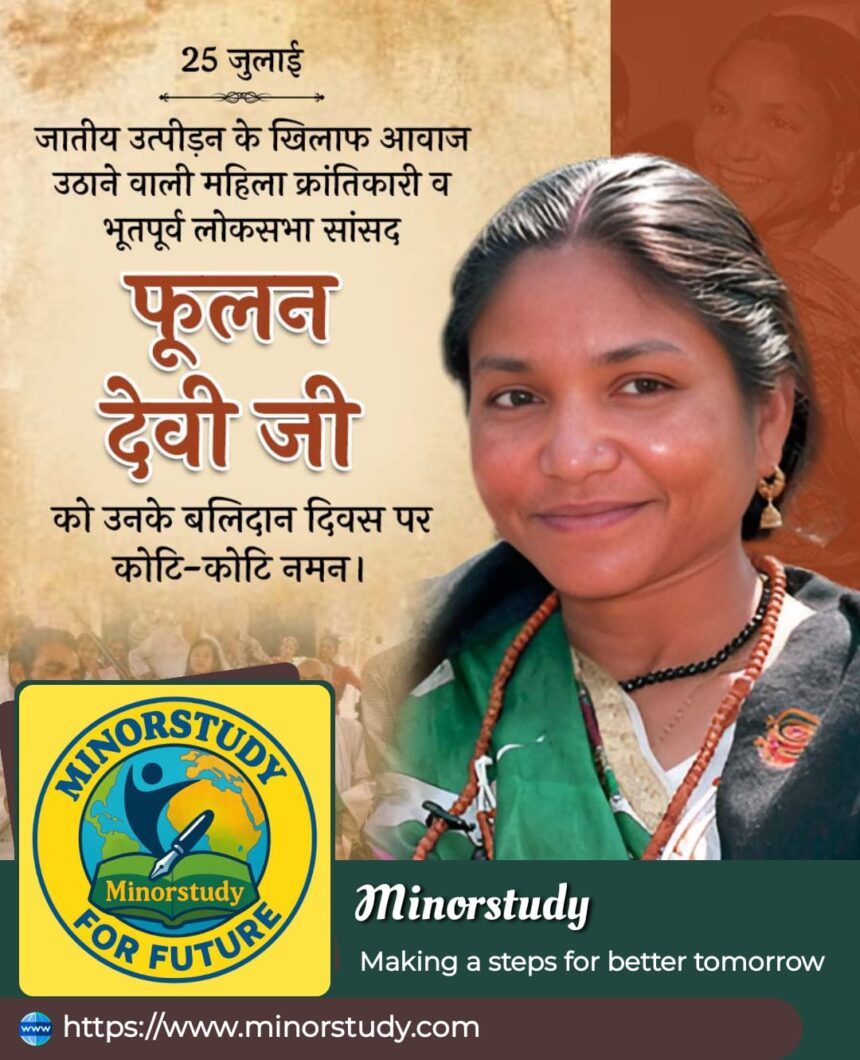🌹 7 Fearless Facts About Phoolan Devi Ji – The Bold Bandit Queen Who Shook India’s Conscience
Phoolan Devi Ji, often remembered as the “Bandit Queen”, was not just a woman with a gun—she was a symbol of rebellion, survival, and justice. Her story is a raw and real portrayal of caste, gender, and systemic oppression in rural India. From being a victim of abuse to becoming a Member of Parliament, her transformation shocked some and inspired millions.
- 📜 History and Early Life of Phoolan Devi Ji
- 🗓️ Timeline of Phoolan Devi Ji’s Life
- 🔥 7 Powerful and Fearless Facts About Phoolan Devi Ji
- 1. She Was a Symbol of Resistance Against Caste Atrocities
- 2. She Led One of the Most Feared Dacoit Gangs
- 3. The Behmai Massacre Was a Turning Point
- 4. She Surrendered with Dignity and Conditions
- 5. She Spent 11 Years in Jail Without Conviction
- 6. She Became an Elected Member of Parliament
- 7. She Was Assassinated in Broad Daylight
- 🙋 Frequently Asked Questions (FAQs)
- Q1: Why is Phoolan Devi known as the “Bandit Queen”?
- Q2: Was Phoolan Devi convicted for any crime?
- Q3: What was her political contribution?
- Q4: How is she remembered today?
- 📌 Observance and Memorials
- 🪔 Significance in Indian Society
- 🌍 Daily Life Impact and Lessons from Her Journey
- 🎉 Wishing and Honoring Phoolan Devi Ji
- 🧭 Conclusion: A Life of Grit, Pain, and Power
This article explores her life journey, untold facts, historical significance, impact on society, and how her story continues to echo in the fight for justice, especially for women and marginalized communities.
📜 History and Early Life of Phoolan Devi Ji
Born: August 10, 1963
Place: Ghura Ka Purwa, Jalaun district, Uttar Pradesh
Caste: Mallah (Nishad) – a marginalized OBC community
Family Background: Born into poverty, Phoolan was the second of four children.
From a very young age, she had to endure social humiliation and caste-based discrimination. Married off at just 11 years of age to a man three times her age, she was subjected to abuse and torture. Phoolan’s early life was marked by injustice, which later ignited her rebellion.
🗓️ Timeline of Phoolan Devi Ji’s Life
| Year | Event |
|---|---|
| 1974 | Married at age 11 to Puttilal (abusive marriage) |
| 1979 | Abducted by dacoits; began life as a bandit |
| 1981 | Carried out the infamous Behmai Massacre |
| 1983 | Surrendered to the Madhya Pradesh Police |
| 1994 | Released from prison after 11 years |
| 1996 | Elected to the Lok Sabha from Mirzapur as a Samajwadi Party MP |
| 2001 | Assassinated on July 25 outside her Delhi residence |
🔥 7 Powerful and Fearless Facts About Phoolan Devi Ji
1. She Was a Symbol of Resistance Against Caste Atrocities
Phoolan Devi’s life was shaped by decades of Dalit-OBC suppression. Her rise from a poor Mallah girl to a fierce rebel signified the anger of oppressed communities, especially in Bundelkhand.
2. She Led One of the Most Feared Dacoit Gangs
After being repeatedly abused by upper-caste landlords, she joined the dacoits. Eventually, she became the leader of her gang, a rare feat for a woman, especially in the early 1980s.
3. The Behmai Massacre Was a Turning Point
On February 14, 1981, her gang executed 20 Thakurs (upper-caste men) in Behmai village—allegedly to avenge her rape and torture. The massacre made national headlines and divided public opinion sharply—some called it revenge, others terrorism.
4. She Surrendered with Dignity and Conditions
In 1983, she surrendered to the Madhya Pradesh government, but only after negotiating:
No death penalty
No police torture
Her gang would receive land and livelihood
She walked down the steps with her rifle on her shoulder and head held high—unapologetic.
5. She Spent 11 Years in Jail Without Conviction
Despite no official conviction, she spent over a decade behind bars. Her release was politically influenced by the Samajwadi Party, which championed her as a symbol of social justice.
6. She Became an Elected Member of Parliament
In 1996 and 1999, Phoolan Devi won the Lok Sabha elections from Mirzapur on a Samajwadi Party ticket. She campaigned on issues like:
Women’s rights
Backward caste welfare
Prisoner rehabilitation
Social security for marginalized women
7. She Was Assassinated in Broad Daylight
On July 25, 2001, at age 37, she was shot dead by assailants linked to upper-caste groups, citing “revenge for Behmai.” Her death marked the end of a short but intense political career—and the beginning of her mythical legacy.
🙋 Frequently Asked Questions (FAQs)
Q1: Why is Phoolan Devi known as the “Bandit Queen”?
Because of her rise from a victim of oppression to a leader of a dacoit gang in Chambal, her life was famously dramatized in the movie Bandit Queen.
Q2: Was Phoolan Devi convicted for any crime?
Despite the Behmai Massacre allegations, she was never convicted. She was released without trial due to political pressure and lack of evidence.
Q3: What was her political contribution?
As an MP, she raised issues of caste oppression, poverty, and women’s rights, especially for survivors of violence.
Q4: How is she remembered today?
She remains a controversial yet powerful symbol—seen by some as a criminal, by many as a folk hero and feminist icon.
📌 Observance and Memorials
Phoolan Devi Smriti Diwas is observed by marginalized communities, especially the Nishad/Mallah caste.
Statues and murals in UP and MP honor her as “Sherni of Chambal”.
NGOs working for women’s rights and caste equity often quote her story as inspiration.
🪔 Significance in Indian Society
Phoolan Devi’s story has deep significance:
🔹 For Caste Reform
She exposed the brutality of the caste system. Her life forces Indian society to confront uncomfortable truths about systemic discrimination.
🔹 For Women’s Rights
A victim of child marriage, domestic abuse, and gang rape—she survived, fought back, and led. She became a symbol of agency for countless Indian women.
🔹 For Political Empowerment of the Marginalized
Her election to Parliament was groundbreaking—an uneducated former bandit as MP? This shattered notions of who can lead in India’s democracy.
🌍 Daily Life Impact and Lessons from Her Journey
Phoolan Devi’s life may seem extraordinary, but it teaches real, human lessons:
Never underestimate inner strength – Even the oppressed can rise.
Society must address injustice, or face rebellion.
Empowerment begins with listening to the unheard.
Education, equity, and representation are the way forward.
Her story reminds us that behind every rebel is a broken system—and change comes when people break silence.
🎉 Wishing and Honoring Phoolan Devi Ji
Even in death, she remains a beacon of hope for the oppressed. On her birth anniversary (August 10) and death anniversary (July 25), people offer:
Floral tributes
Cultural events in her memory
Social justice debates
Film screenings and panel talks
Tribute Message Example:
“Salute to Sherni Phoolan Devi Ji — who chose dignity over silence, resistance over fear, and stood as the voice of millions unheard. Jai Phoolan!”
🧭 Conclusion: A Life of Grit, Pain, and Power
Phoolan Devi Ji’s life is not a fairy tale. It is a brutal yet empowering story of how far one can go with willpower, even when everything is stacked against them. Her gun may have fallen silent, but her voice roars across generations.
She was not perfect, but her journey reflected the cracks in our justice system—and her rise was a warning bell to the privileged, and a hope call to the oppressed.
Phoolan Devi Ji is not just a name—she’s a movement, a mirror, and a message:
“When justice is denied, rebellion becomes the answer.”








